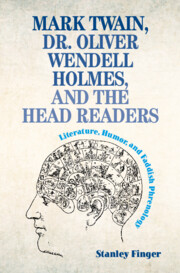 Mark Twain, Dr. Oliver Wendell Holmes, and the Head Readers
Mark Twain, Dr. Oliver Wendell Holmes, and the Head Readers Published online by Cambridge University Press: 17 April 2023
Holmes and Clemens wanted to educate the public about the head reading fad. But Clemens was taking on a less controversial topic when Mark Twain began to assail the head readers during the 1870s. By this time, Paul Broca had shown that the clinical-pathological method could delineate a brain region for fluent speech. Further, Fritsch and Hitzig in Germany and David Ferrier in England were now discovering special forebrain areas for voluntary movements, the different sensory systems, and even higher functions by stimulating different parts of the brain in animals and making lesions. Holmes did not recognize these better ways to understand the mind and brain when he began to lampoon phrenology in 1859. Thus, there was a great scientific divide separating what Holmes and Clemens did, even though both men shared similar objectives and helped take the luster out of head readings. I conclude with the thoughts that popular literature can be a valuable tool for appreciating scientific and medical developments, and that Holmes and Clemens were right not to paint with too broad a brush. True, phrenological craniology deserved to be ridiculed, but phrenology also had positive features that would become fundamental tenets of psychology and the neurosciences.
To save this book to your Kindle, first ensure [email protected] is added to your Approved Personal Document E-mail List under your Personal Document Settings on the Manage Your Content and Devices page of your Amazon account. Then enter the ‘name’ part of your Kindle email address below. Find out more about saving to your Kindle.
Note you can select to save to either the @free.kindle.com or @kindle.com variations. ‘@free.kindle.com’ emails are free but can only be saved to your device when it is connected to wi-fi. ‘@kindle.com’ emails can be delivered even when you are not connected to wi-fi, but note that service fees apply.
Find out more about the Kindle Personal Document Service.
To save content items to your account, please confirm that you agree to abide by our usage policies. If this is the first time you use this feature, you will be asked to authorise Cambridge Core to connect with your account. Find out more about saving content to Dropbox.
To save content items to your account, please confirm that you agree to abide by our usage policies. If this is the first time you use this feature, you will be asked to authorise Cambridge Core to connect with your account. Find out more about saving content to Google Drive.